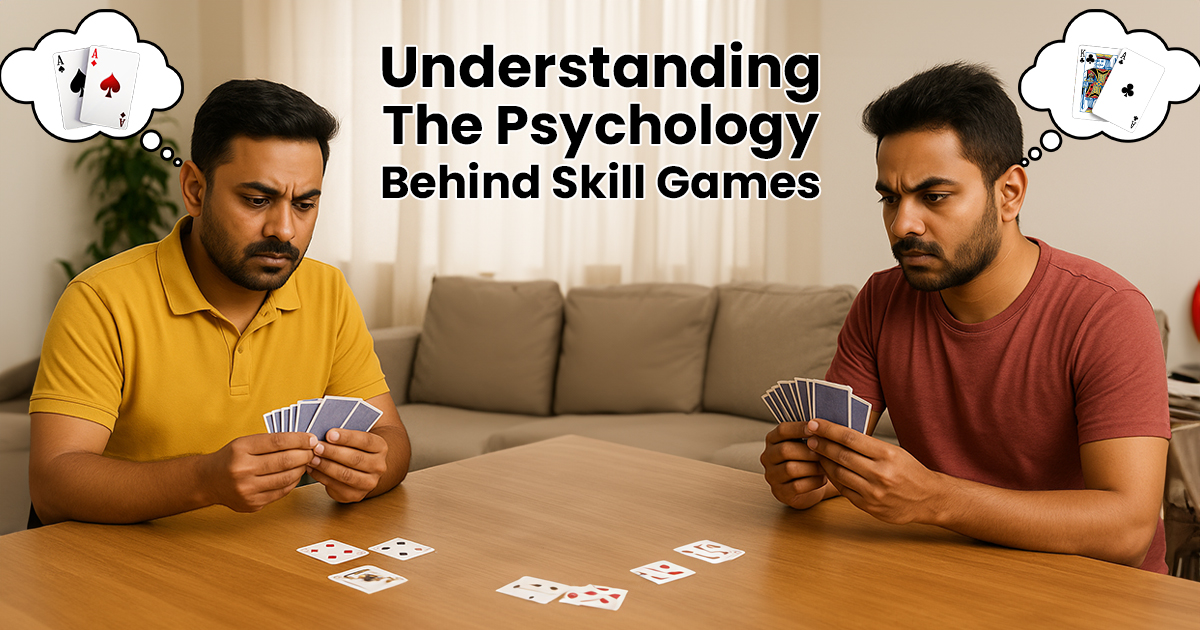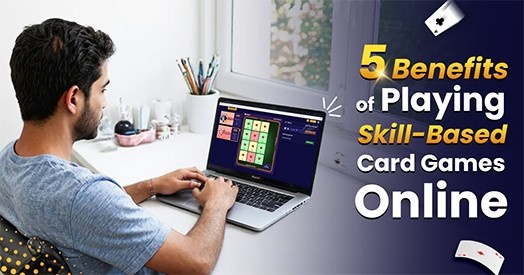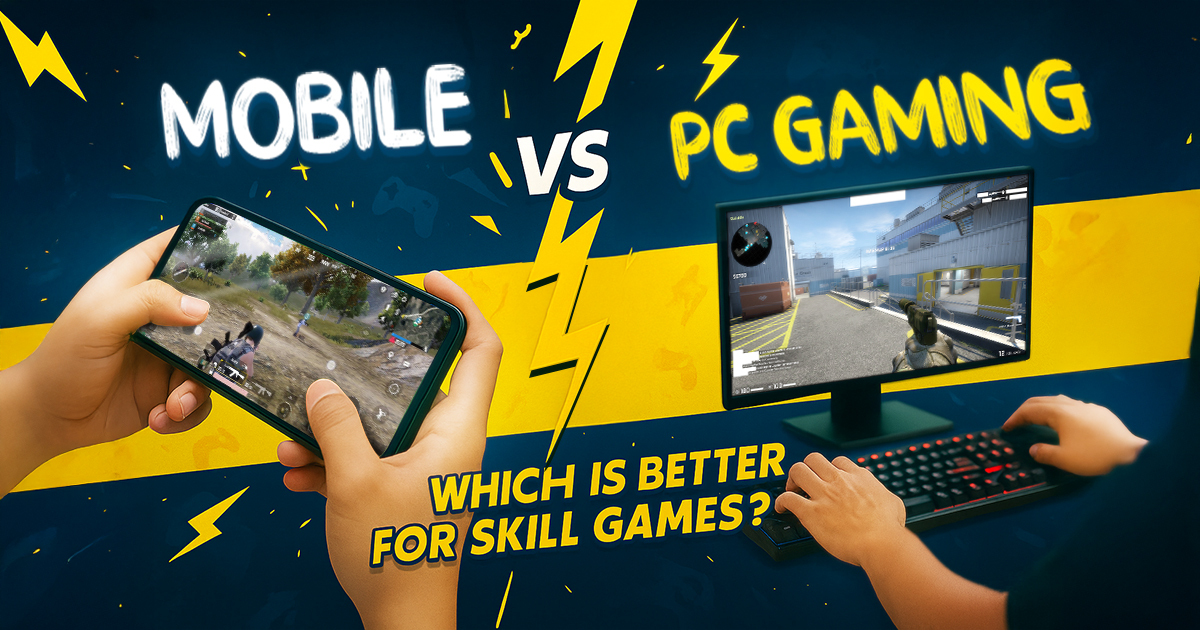
By Vichar | June 02, 2025
Understanding the Psychology Behind Skill Games
Have you ever experienced that delightful sound of the final piece of a block falling into place? Or the rush of victory after winning an exciting card game? These are not just moments of brief enjoyment; they come within the ambit of the fascinating world of human psychology. Skill-based games possess much more depth than the games where luck plays a huge role. Skill-based games challenge our acumen and cognitive abilities with an interesting mix of thrill and reward. Let us explore the psychological factors behind the appeal of these games.
The Mastery Of Skills: Most importantly, what makes skill-based games so thrilling is our basic desire for mastery. Psychologist Robert White first used the term competence motivation, which indicates that we have a basic human need to experience the thrill while operating in the gaming world. Skill-based games showcase a controlled simulation for us to experiment and develop our skills. Every successful step, every situation, serves to stimulate this internal motivation and provides us with a feeling of success and increased self-satisfaction.
A Mental Exercise: Skill games are nothing short of mental exercises. They require concentration, attention, memory, problem-solving, and strategic thinking. From remembering the number of cards to computing chances of winning in card games or strategizing multiple moves ahead in chess, these games actively challenge many cognitive abilities. This mental exercise can be very satisfying, bringing a feeling of intellectual challenge and keeping mental stagnancy away in the long term.
The Power of Learning and Feedback: All the skill-based games are constructed upon the immediate feedback mechanism. We receive an instant response to what we are doing, either a missed move, a nice combination, or a lost point. The instantaneous feedback loop is the backbone of learning. It reminds us of our errors, changes our approach, and makes us better with time. The trial and error process along with the realization of real progress is a most successful means to continuously motivate us.
The Allure of Challenge: Skill games operate on a thin line between challenge and our level of skill at any point in time. When a game is too easy to win for us, we get bored, whereas when the game is difficult to win, we get frustrated. The sweet spot is exactly somewhere in the middle, which is a state of total engagement and focused energy in a game, with full involvement and satisfaction in the process. Skill-based games that are well-designed tend to bring a constant flow of challenges that require skill, which makes the experience deeply absorbing and rewarding.
The Role of Pattern Recognition and Prediction: Most of the skill-based games are dependent upon our capacity to recognize patterns and predict what will happen next. Whether it means recognizing repeated patterns in a game or facing unexpected situations in a card game, our minds are in a state of continuous activity, trying to recognize these patterns. We get an adrenaline rush when we get the prediction right and use that information to our benefit. Winning skill-based games based on pattern recognition satisfies our intellect.
Escapism and Stress Relief: While thought-based games are mentally demanding, they can also help reduce our tension and provide us with an avenue of escapism. Being involved in a game that demands focus, especially one that offers a feeling of control, can serve to distract us from the anxiety and tensions of daily life. The engaging quality of most skill games demands close concentration which in fact grants us a temporary relief from our anxieties. The sense of achievement and advancement in the game can also boost mood and provide us with a good emotional release.
Real Life Applications: The psychological advantage of skill games goes beyond having fun. The cognitive abilities gained from playing games, including problem-solving, planning, and decision-making, can be applied to better performance in real life, from academics to the workplace. Moreover, mastery and achievement experienced through playing games give us the confidence to overcome challenges in the real world.
Skill games are not just a form of leisure; they are intricate psychological experiences that get to our soul's deepest learning and discovery needs. As we enjoy the psychology in these games, we can better appreciate how they get our minds involved and give us effortless entertainment each day. The next time you engage in playing a strategic skill game, remember you are not just playing but exercising your brain.
Popular
- Is It Legal to Earn Money from Online Games in India? [Updated 2025 Guide]
- AI in Gaming: How Machine Learning Is Changing Skill-Based Platforms
- 5 Benefits of Playing Skill-Based Card Games Online
- How Bazigar Ensures Fair Play: Anti-Cheat Measures Explained
- Mobile vs PC Gaming: Which is Better for Skill Games?
- HOW IS BAZIGAR A RELIABLE GAMING PLATFROM ?
- Understanding the Psychology Behind Skill Games
- Top 10 Records Created by Card Enthusiasts
- Tips and Tricks to Win Games on Bazigar
- Card Game Slangs and Terminology: A Beginner's Guide
- Top 20 Historical Facts About Playing Cards
- Debunking Common Misconceptions About Online Card Games
- The Importance of Responsible Gaming: Tips and Guidelines
- The Role of Mathematics in Card Games: Probability, Statistics, and Strategy
- The Mysterious Origins of the Joker Card: From Court Jesters to Card Game Wildcards
- The Symbolism Behind Playing Cards: What Do the Suits and Faces Really Mean?
- Bazigar - online card games for real money
- Top 5 Best Online Card Games in 2024
- Online Card Games - The Best Source Of Entertainment
- Finding The Unfound: Underrated Android Games That Deserve More Attention in 2024
- Try Matrix: The Best Online Card Game Ever
- Slither Your Way to Success: A Guide to Snake Game Tournament.
- From simple block game to online Tetris: Master tetris and win exciting cash prize
- Battle Ground of Solitaire: A ground where your skills matter
- The Ultimate Brain Teaser That Never Gets Old!
- Popularity of Mobile Games in 2024
- The Future of Solitaire Mobile Gaming: Trends and Innovations to Watch Out
- Tetris: A Timeless Gem That Fits Every Generation
- Tips to Play Solitaire Games Online
- A Beginner’s Guide to Playing Snake Game by Bazigar: Rules and Basics
- Success Starts with Knowing the Rules
- Snake Game Evolution: From Classic Nokia Phones to Modern Mobile Apps
- How Solitaire Can Help Reduce Stress and Anxiety
Read this next
DOWNLOAD THE APP NOW
Enter Mobile Number to get App Download Link
By clicking Get App Link, I agree to the Terms & Conditions and Privacy Policy.
I am giving my consent to receive updates through SMS.
Or Scan The QR Code To Download Bazigar App



![Is It Legal to Earn Money from Online Games in India? [Updated 2025 Guide] Is It Legal to Earn Money from Online Games in India? [Updated 2025 Guide]](https://bazigar.in/about-us/uploads/blogs/thumbnails/blog_thumb_1752469451.jpg)










